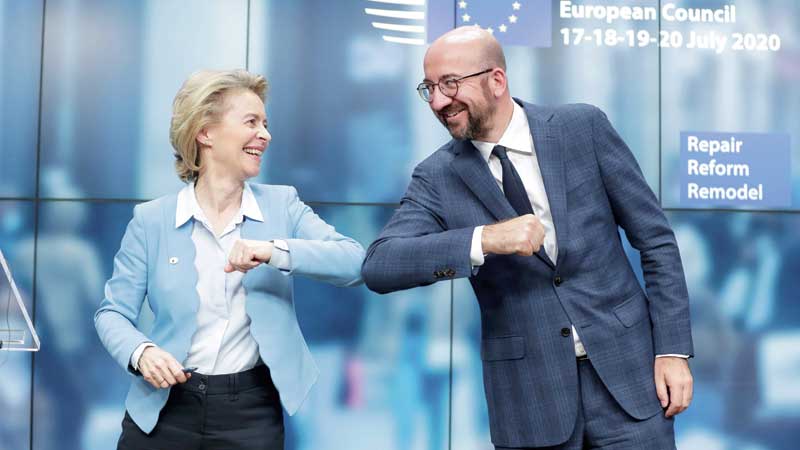

Françoise MICHEL -
Running the European Union is no simple matter and the duo at the head of the bloc of 27 very distinct nations has struggled mightily to have their voices heard.
It is one of the EU’s peculiarities that its leadership is composed of two people, sometimes to the bemusement of other heads of state and governments meeting at international summits or events.
European Commission President Ursula von der Leyen and EU Council President Charles Michel took office a year ago — but there was no honeymoon period to find their footing, as they were engulfed within months by the coronavirus pandemic.
“The beginning of the pandemic was very poor, devastating for both of them’’, said Rosa Balfour, a director at Carnegie Europe, of the pair’s performance in the unexpected crisis. Between chaos at closed internal borders or unilateral export bans on medical equipment, the continent gave an unfortunate image of selfish disunity as countries chose national interest over European spirit.
The two leaders were helpless against these my-country-first instincts, causing fury in Italy, which was the first and hardest hit by the virus as their EU partners looked on in silence. As thousands died in northern Italy’s overwhelmed hospitals, a visit by the two leaders would have been essential, said Yves Bertoncini, European affairs consultant. “They missed a golden opportunity.”
In their defence, the very nature of EU leadership makes it difficult for the top officials to shine.
Both are unelected and chosen by the EU’s 27 national leaders, who hold the real cards of power in Brussels, and they are rarely household names to average European voters. But, when things go wrong, national politicians are quick to blame Brussels — at the risk of feeding the euroscepticism that, in the case of Britain, snowballed into a full-blown EU divorce.
In April, former German defence minister von der Leyen apologised to Italy and much of the next months was devoted to making up for the EU’s shortcomings in those first crucial days. This came thanks to Chancellor Angela Merkel who, at the urging of France, reversed a long-held German position to propose a massive stimulus plan that would be paid for by EU-wide borrowing.
At a historic four-day summit in July, the other EU chief, former Belgian prime minister Michel, corralled the 27 leaders into accepting a 1.2 trillion euro ($1.4 trillion) recovery and budget plan, defying strong opposition.
With that package, von der Leyen won more influence “in the cathedral of the EU”, said Balfour.
It will be her commission, the EU’s executive arm, that will dispatch the money to members, making key decisions on Europe’s economic recovery. — AFP
Oman Observer is now on the WhatsApp channel. Click here



